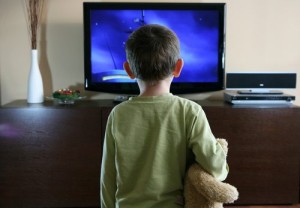British children who spend most time in front of televisions and computer screens have poorer self-esteem and greater emotional tribulations, according to a study released by Public Health England.
The information explains that excessive “screen time” (more than four hours a day) was linked to anxiety and depression and was responsible for limiting a child’s opportunity for social interaction and physical activity.
“The greater the time spent in front of the screen, the greater the negative impact on both behavioural and emotional issues relating to the child’s development,” said Professor Kevin Fenton, director of health and wellbeing at PHE. Professor Fenton said that too much screen time limited a child’s opportunities for physical activity and face-to-face social interaction with friends and family, which are key factors in reducing childhood anxiety.
British children spend excessively large amounts of their time in front of screens, compared to counterparts in other Western European countries, the report observed.
“In the UK, 62 per cent of 11-year olds, 71 per cent of 13-year olds and 68 per cent of 15-year olds report watching more than two hours of TV a day on weekdays, compared to Switzerland where the figure is less than 35 per cent across all three age groups.”
Professor Fenton said there was a clear “dose-effect” in the impact of screen time on a child’s emotional state, and that “each additional hour of viewing increases children’s likelihood of experiencing socio-emotional problems and lower self-esteem”.
The report, titled ‘How healthy behaviour supports children’s wellbeing’, found that: “Higher levels of TV viewing are having a negative effect on children’s well-being, including lower self-worth, lower self-esteem and lower levels of self-reported happiness.”
The amount of time British children spend in front of televisions, computers and other screens is also increasingly rapidly, driven by the popularity of computer games. Between 2006 and 2010 “the proportion of young people playing computer games for two hours or more a night during the week increased from 42 per cent to 55 per cent among boys and 14 per cent to 20 per cent among girls”, the report said.
The study was based on research conducted by the Children’s Society among 42,000 eight to 15 year olds, and on other data. Lily Caprani, its director of policy, said that the children who were least likely to be happy with their lives tended to be the ones who spent longer in front of screens.
She said that social interaction via a computer or mobile phone did not deliver the same benefits in emotional well-being. “It’s nowhere near,” she said. “You have to be physically present with your friends to get the benefits of social interaction. Texting, Facebooking or even chatting on the phone has a remoteness that means you lose a lot of the positive impact.”
But the television industry last night rejected the idea that it impacts negatively on children. “We are proud that there is so much carefully created and curated TV content for children – to watch alone or with their families – that excites and inspires them. That might be watching Professor Brian Cox, Dora the Explorer or Hannah Cockcroft,” said Lindsey Clay, Managing Director of industry body Thinkbox.
She added that TV is “one of the main sources of learning what exactly constitutes a healthy lifestyle.”










